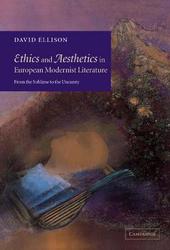
|
Ethics and Aesthetics in European Modernist Literature: From the Sublime to the Uncanny
Paperback / softback
Main Details
| Title |
Ethics and Aesthetics in European Modernist Literature: From the Sublime to the Uncanny
|
| Authors and Contributors |
By (author) David Ellison
|
| Physical Properties |
| Format:Paperback / softback | | Pages:308 | | Dimensions(mm): Height 229,Width 152 |
|
| Category/Genre | Literary theory
Literary studies - from c 1900 -
Philosophy - aesthetics |
|---|
| ISBN/Barcode |
9780521025164
|
| Classifications | Dewey:809.9112 |
|---|
| Audience | | Professional & Vocational | |
|---|
| Illustrations |
Worked examples or Exercises
|
|
Publishing Details |
| Publisher |
Cambridge University Press
|
| Imprint |
Cambridge University Press
|
| Publication Date |
16 March 2006 |
| Publication Country |
United Kingdom
|
Description
David Ellison's book is an investigation into the historical origins and textual practice of European literary Modernism. Ellison's study traces the origins of Modernism to the emergence of early German Romanticism from the philosophy of Immanuel Kant, and emphasizes how the passage from Romanticism to Modernism can be followed in the gradual transition from the sublime to the uncanny. Arguing that what we call High Modernism cannot be reduced to a religion of beauty, an experimentation with narrative form, or even a reflection on time and consciousness, Ellison demonstrates that Modernist textuality is characterized by the intersection, overlapping, and crossing of aesthetic and ethical issues. Beauty and morality relate to each other as antagonists struggling for dominance within the related fields of philosophy and theory on the one hand (Kant, Kierkegaard, Nietzsche, Freud) and imaginative literature on the other (Baudelaire, Proust, Gide, Conrad, Woolf, Kafka).
Reviews"Ellison's book makes our experience of modernist writers and texts and more subtle while also futhering an arresting argument about philosophical shifts during this literary-historical moment. Perhaps most importantly, it 'infects' us with the author's delight in both aesthetic enjoyment and art's unique mode of ethical inquiry." Modernism "[a] worthy contribution to the ethics and politics of literary Modernism." Woolf Studies Annual "...a collection of excellent deconstructive close readings in European philosophy and literaure." The Wordsworth Circle
|